
Italy ranks fifty-first in the world with + 23% growth in cryptocurrency exchange especially in the video games and NFT sector
According to the new Global Crypto Adoption Index report, which is periodically published by the specialized company Chainalysis and which records the trend of investments made in cryptocurrencies, Italy ranks sixth in Europe among the most relevant markets in the sector and fifty-first in the world. The report takes into account the measurement of movements in the general market of digital coins whose transitions are usually protected by blockchain protocols.
In recent years, Europe has become an important center for investments in digital currencies and, in the last year, it has 6 of the 40 largest cryptocurrency user countries in the world. Before Italy, sixth nation on the list but third for growth, there are the United Kingdom, Germany, France, Spain and Portugal which have contributed to the investment in digital currencies by all of Europe up to a value of 1.3 trillion dollars traded between 2021 and 2022.
In Italy, the most interesting aspect relating to the cryptocurrency market concerns the nature of the same and consists above all of NFT and exchanges in the gaming sector, which are constantly growing, occupying 30% of all digital movements in the nation. This differentiation is also due to the growing popularity towards the metaverse world and everything that can be “commercialized” in it through the blockchain.
The sector, for example, of blockchain-based gaming, is a rapidly expanding sector that in recent years has taken hold among millions of fans of videogame products. The phenomenon is often also called “crypto gaming” and represents a series of video games defined as “play-to-earn” as there is the possibility of earning real money, reselling the NFT (Non-Fungible Token) associated with the elements that can be obtained simply by playing. There are numerous sites that act as marketplaces dedicated to NFTs where they can even be created as well as sold and purchased.
The basic idea is to attribute, during the videogame programming phase, a specific digital starting value, for certain elements present in the videogame that can correspond to accessories, characters or settings that will come, in case of obtaining by the gamer, resold in the target market to generate revenue in cryptocurrency. Naturally, all the movements envisaged in the video game blockchain respect the fluctuations of the digital market and often do not guarantee a real gain for the player, except in countries of the world where the system is now well tested and part of an economic network large enough that it is expected a good remunerative response
Although, then, blockchain-based games are usually free-to-play, they often require an initial investment in order to start the digital exchange and, therefore, to really play, thus representing in all respects a sort of participation fee in order to start potentially profitable negotiations. All this therefore requires the player to define a special digital “wallet” in which to store NFTs and cryptocurrencies related to the game in use.
Currently, games that allow trading in cryptocurrencies and NFTs are considered of poor quality technically speaking, since the particularity on which programmers focus in development phase is still focused on the blockchain. This lack, however, is driving pure gamers away from the use of the video games in question, leaving the purchase of them to people interested only in the economic potential. This practice risks to transform the world of blockchain-based digital games into a sector not devoid of examples of gambling addiction.
Another fragile issue of the crypto-video game and NFT sector lies in the extreme volatility linked to their value and in the continuous updating of the same which therefore does not allow for a relative, constant and easy to understand market trend.



 Subscribe
Subscribe